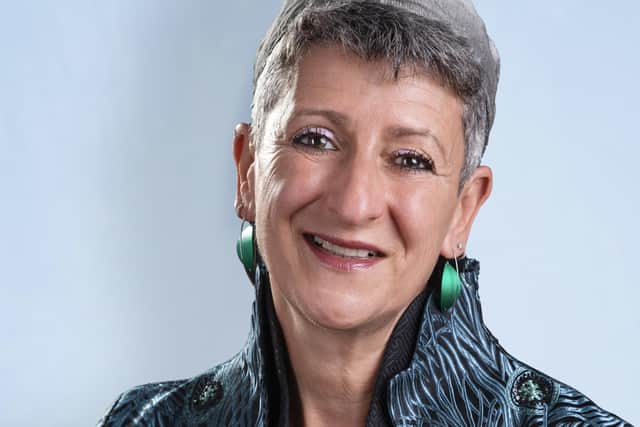What I learnt from moving visit to Muslim schools in Bradford: Rabbi Laura Janner-Klausner
My hometown, London, along with other parts of the country, has hosted mass demonstrations both calling for justice for Palestinians, interfaith vigils and demonstrations against antisemitism. Social media feeds are full of polarised opinions. Many in friends and family in different Jewish communities feel unsafe, stating that it felt like how they imagine the antisemitism of the 1930s.
Friends and colleagues in Muslim communities also tell me that they are also under immense pressure as they recall their own historical traumas and spoke particularly of the Naqba (Catastrophe) of 1948 as well as citing the ongoing situation of Palestinians. Historic wounds of both Jewish and Muslim communities reignited by present day tragedy.
Advertisement
Hide AdAdvertisement
Hide AdIt was with some trepidation, therefore, that I, the Rabbi at Bromley Reform Synagogue, and the former Senior Rabbi of Reform Judaism in the UK, accepted a recent invitation to visit three schools in Yorkshire – all part of the iExel Education Trust – two Muslim girl schools and one Muslim majority mixed primary school.


The iExel Education Trust focuses on supporting schools so as to fulfil their mission of achieve prosperity and peace by providing an outstanding education for all. These are inspiring values and more importantly, my experience in Bradford showed me that when stress is high, such as in a horrendous and divisive war, these aspirations still hold true.
I admit. I was anxious on my way up to Bradford. Would I really be welcome? Far too many of the victims in the Middle East are children. How would the pupils at the school react to my presence as a Jew, as a rabbi?
My visit was not out of the blue. I was invited by wonderful, dedicated and visionary colleagues and friends from the iExel Trust because I had previously worked alongside the Muslim communities on interfaith projects, particularly having real conversations on Palestine and Israel.
Advertisement
Hide AdAdvertisement
Hide AdThis followed my work in the early 1990s when I had co-led the ‘Peoples’ Peace’ - Palestinian-Israeli dialogue with a Palestinian partner as part of the Oslo Peace Accord negotiations at a time when I lived in Jerusalem.
I love conversations between Muslims and Jews, especially as they are often honest, challenging, yet warm.
Coming to Bradford last week was to renew and extend existing connections. My concern was whether the physical war raging many miles away had the capacity to become a war of minds, or worse, here in the UK. Would the explosive decisions of political leaders so far away have caused irreparable damage to the trust between my friends and myself?
Together with three fabulous Principals and one Vice Principal, Professor M. Khurshid Khan, the Chief Executive Officer of the iExel Education Trust, enthusiastically showed me around three schools which are blessed to be under the wing of the iExel Trust. IQRA Primary Academy has a mixed faith enrolment, Bronte Girls Secondary Academy is a Muslim secondary school which also caters for non-Muslims and has a mixed hijab, non-hijab uniform while at the 850 pupil Feversham Girls Academy reflects diversity in the Muslim communities by having an all hijab uniform aligned to their Islamic faith values.
Advertisement
Hide AdAdvertisement
Hide AdThese schools focus on preparing their pupils for modern life, and their Ofsted inspections reflect their commitment to academic achievement.
Walking around each school it was immediately clear that this secular teaching is melded with the upholding and practice of Islamic values.
As I moved around the corridors, I was at first conscious of the difference between us – the outwards differences of clothing and religious background but within minutes, I was overwhelmed by the common ground of values, warmth and desire for learning from each other.
The Muslim schools displayed verses from the Koran on the walls and these Islamic values were reflected in our conversations. Both Islam and Judaism place emphasis on heritage – the irony of course being that they trace back to the same ancestors. However, the values don’t just reach back vertically into the past, they also connect these young people horizontally with their peers in Palestine.
Advertisement
Hide AdAdvertisement
Hide AdI was so profoundly moved that the commonality in the values systems between Judaism and Islam also meant that we could find a connection across the faith divide.
I am a firm believer that in relatively peaceful times, interfaith work needs to be far more honest than just conversations over tea and biscuits. It is hard to talk about problematic, painful issues and it takes practice. It’s good to swap recipes and show each other around buildings, but it is vital to start to find a way to speak about walls, settlements, suicide bombings, access to religious sites, rights of return and all the years of complicated interwoven history.
Walking the corridors of these inspiring Bradford schools, listening to what the teachers and pupils said to me, I was aware that this visit was only successful because of the work that had been put in beforehand to build trust.
Maintaining genuine communication – really listening and respecting and finding what is jointly valued must be the foundation of our shared hope for future peace and security for all people. I’m so looking forward to my next visit.
Comment Guidelines
National World encourages reader discussion on our stories. User feedback, insights and back-and-forth exchanges add a rich layer of context to reporting. Please review our Community Guidelines before commenting.